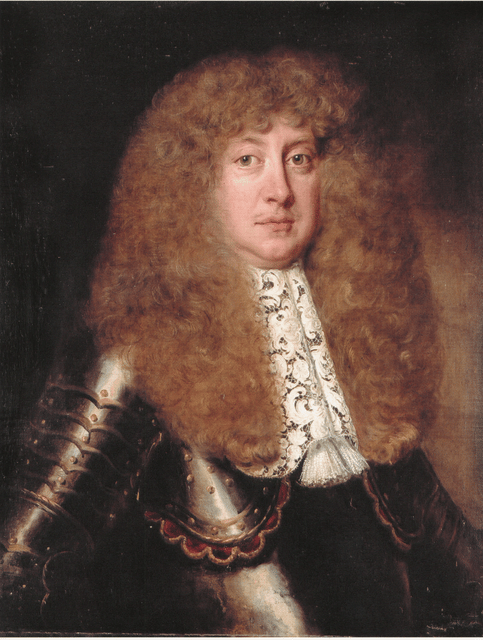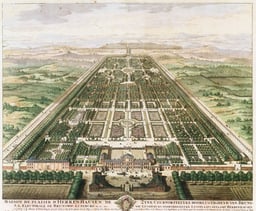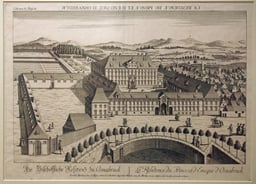Ernest Augustus, Elector of Brunswick-Lüneburg

Ernest Augustus, Elector of Brunswick-Lüneburg

| Ernest Augustus | |
|---|---|
| ** ** **
| |
| Elector of Hanover | |
| Reign | 19 December 1692 –23 January 1698 |
| Successor | Georg Ludwig |
| |
| Reign | 18 December 1679 –23 January 1698 |
| Predecessor | John Frederick |
| Successor | Georg Ludwig |
| Born | (1629-11-20)20 November 1629 Herzberg am Harz, Göttingen, Germany. |
| Died | 23 January 1698(1698-01-23)(aged 68) Herrenhausen Palace, Hanover, Germany. |
| Burial | 18 March 1698 Hanover, Germany. |
| Spouse | Sophia of the Palatinate |
| Issue more... |
|
| House | Hanover |
| Father | George, Duke of Brunswick-Lüneburg |
| Mother | Anne Eleonore of Hesse-Darmstadt |
Ernest Augustus (German: Ernst August; 20 November 1629 – 23 January 1698) was a Duke of Brunswick-Lüneburg and ruled over the Principality of Calenberg (with its capital Hanover), a subdivision of the duchy. He was appointed Prince-elector, but died before the appointment became effective. He was also the Prince-Bishop of the Prince-Bishopric of Osnabrück.
| Ernest Augustus | |
|---|---|
| ** ** **
| |
| Elector of Hanover | |
| Reign | 19 December 1692 –23 January 1698 |
| Successor | Georg Ludwig |
| |
| Reign | 18 December 1679 –23 January 1698 |
| Predecessor | John Frederick |
| Successor | Georg Ludwig |
| Born | (1629-11-20)20 November 1629 Herzberg am Harz, Göttingen, Germany. |
| Died | 23 January 1698(1698-01-23)(aged 68) Herrenhausen Palace, Hanover, Germany. |
| Burial | 18 March 1698 Hanover, Germany. |
| Spouse | Sophia of the Palatinate |
| Issue more... |
|
| House | Hanover |
| Father | George, Duke of Brunswick-Lüneburg |
| Mother | Anne Eleonore of Hesse-Darmstadt |
Biography

Arms of Ernest August as Elector-designate 1692–1698

Arms of Ernest as Duke of Brunswick-Lüneburg 1661–1692
Ernest Augustus was born at Herzberg Castle near Göttingen as the youngest son of George, Duke of Brunswick-Lüneburg and Anne Eleonore of Hesse-Darmstadt.
In 1658, he married Sophia of the Palatinate in Heidelberg. She was the daughter of Frederick V, Elector Palatine and Elizabeth Stuart of England, and granddaughter of King James I of England.
As the fourth son, Ernest Augustus had little chance of succeeding his father as ruler. Therefore, the couple had to live in the Leineschloss at the Hanover court of Ernest Augustus' eldest brother. However, in the Peace of Westphalia of 1648, it had been agreed between catholic and protestant powers, that the rulership of the Prince-Bishopric of Osnabrück should alternate between both churches, and that the respective protestant bishops should be members of the House of Brunswick-Luneburg. When the Osnabruck throne became vacant in 1662, the family appointed Ernest Augustus Prince-Bishop; Ernest Augustus and Sophia moved to Iburg Castle, together with their two eldest sons and Sophia's niece Elizabeth Charlotte of the Palatinate. In 1667 they began to build a more up-to-date residence, Osnabruck Palace, and in 1673 they moved there. Their youngest son was born there in 1674.
However, after two of his elder brothers had died without sons, Ernest Augustus inherited part of his father's territories in 1679, the Principality of Calenberg, with the Principality of Göttingen included. In 1680 the family moved back to Hanover.
In 1683, against the protestations of his five younger sons, Ernest Augustus instituted primogeniture, so that his territory would not be further subdivided after his death, and also as a pre-condition for obtaining the coveted electorship. He participated in the Great Turkish War on the side of Leopold I, Holy Roman Emperor. In 1692, he was appointed Prince-elector by Emperor Leopold I, thus raising the House of Hanover to electoral dignity; however, the electorship did not come into effect until 1708. He was nonetheless recognized as Elector of Hanover, the very first. Ernest Augustus died in 1698 at Herrenhausen Palace, Hanover. He was succeeded as duke by his eldest son, George Louis, who would later succeed to the British throne as "King George I of Great Britain".
The main residences of the branch of the Dukes of Brunswick-Luneburg which ruled the Principality of Calenburg-Göttingen were the Leineschloss in the city of Hanover and the summer residence Herrenhausen Palace, a short distance outside the city. Ernest Augustus and Sophia had the Great Garden at Herrenhausen enlarged after Italian and Dutch models, creating one of the most distinguished baroque formal gardens of Europe.
Ancestry
Issue
| Name | Birth | Death | Notes |
|---|---|---|---|
| By his wife, Sophia of the Palatinate: | |||
| George Louis | 28 May 1660 | 11 June 1727 | Firstly, succeeded his mother Sophia as heir presumptive to the throne of Great Britain; secondly, succeeded Anne, Queen of Great Britain as King George I of Great Britain, the first member of the Hanoverian Dynasty to rule Britain. |
| Frederick Augustus | 3 October 1661 | 10 June 1691 | Died at the Battle of St. Georgen |
| Stillborn son | February 1664 | February 1664 | |
| Maximilian William | 13 December 1666 | 27 July 1726 | |
| Stillborn son | 13 December 1666 | 13 December 1666 | Twin of Maximilian |
| Sophia Charlotte | 2 October 1668 | 21 January 1705 | Married King Frederick I of Prussia |
| Charles Philip | 13 October 1669 | 1 January 1690 | Died at the Battle of Pristina |
| Christian Henry | 29 September 1671 | 31 July 1703 | Died during the Battle of Munderkingen when drowned in the Danube |
| Ernest Augustus | 7 September 1674 | 14 August 1728 | Duke of York and Albany |
| By his mistress, Clara Elisabeth von Platen: | |||
| Ernest August von Platen | 1674 | 1726 | had issue |
| Sophie Charlotte von Platen | 10 April 1675 | 1 May 1725 | married 1701 Johann Adolf Baron von Kielmansegg, had issue |

